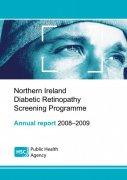Eye screening for diabetics – prevents blindness

Diabetes is a common condition affecting around 69,000 people in Northern Ireland. One of the possible complications of diabetes is a condition called diabetic retinopathy, which can cause sight loss and blindness. Retinopathy causes damage to the tiny blood vessels (capillaries) that nourish the retina, the tissues in the back of the eye that deal with light. This can seriously affect vision.
Research shows that if retinopathy is identified early, for example through retinal screening, and treated appropriately, blindness can be prevented in the majority of people with diabetes, both type 1 and type 2.
Screening programme
In Northern Ireland, a diabetic retinopathy screening programme (DRSP), run by the Public Health Agency (PHA), has been put in place to screen all eligible people with diabetes aged 12 years and over.
Dr Bernadette Cullen, Consultant in Public Health Medicine, PHA, said: “Screening detects problems early and allows appropriate treatment to be offered. It is vital that everyone with diabetes attends diabetic retinopathy screening when it is offered. Early detection of potential problems offers a very real opportunity to intervene and, with appropriate treatment, can prevent blindness in the majority of those at risk.”
The screening test
The screening test involves photographs being taken of the back of each eye, using a special camera. The test is painless and takes about 15 minutes. If the person is over 50 years of age, they will need to have drops put in their eyes about 15 minutes before the test to dilate their pupils.
The photographs are sent to the regional screening centre for analysis by trained graders. Results will show whether patients require further referral for assessment or treatment by hospital eye services (HES). If this is not required, screening will be offered again the following year.
GPs are informed of all results and if the patient is under the care of a diabetologist, they too will be informed. Patients are informed of results by their GP and if they need an urgent referral, protocols are in place to ensure this happens.
Many people with diabetes attend their optometrist (optician) on a regular basis to have a sight test for glasses. It is important they continue to do this – this test is free to people with diabetes.
It is also vital that people with diabetes attend for diabetic retinopathy screening when invited, regardless of how or where their diabetes is treated, or whether they visit a hospital consultant/GP for their diabetic care.
Patients are invited to screening via their GP practice. An information leaflet to help patients make an informed decision to attend for screening is also sent. This can be accessed via the PHA website: www.publichealth.hscni.net.
Contact PHA Press Office on 028 9031 1611
- In 2008–2009, the first complete year after roll-out of the programme, approximately 43,000 screening appointments were offered. Over 75% of those invited attended for the screening test (32,256). Referral for full ophthalmological assessment was advised in 6% of those screened.
- During 2009–2010, approximately 45,900 screening appointments were offered. Over 73% of those attended for the screening test (33,685). DRSP plan to invite 50,000 patients for screening during 2010–2011. If you receive an invite, please take the opportunity to attend your appointment.
